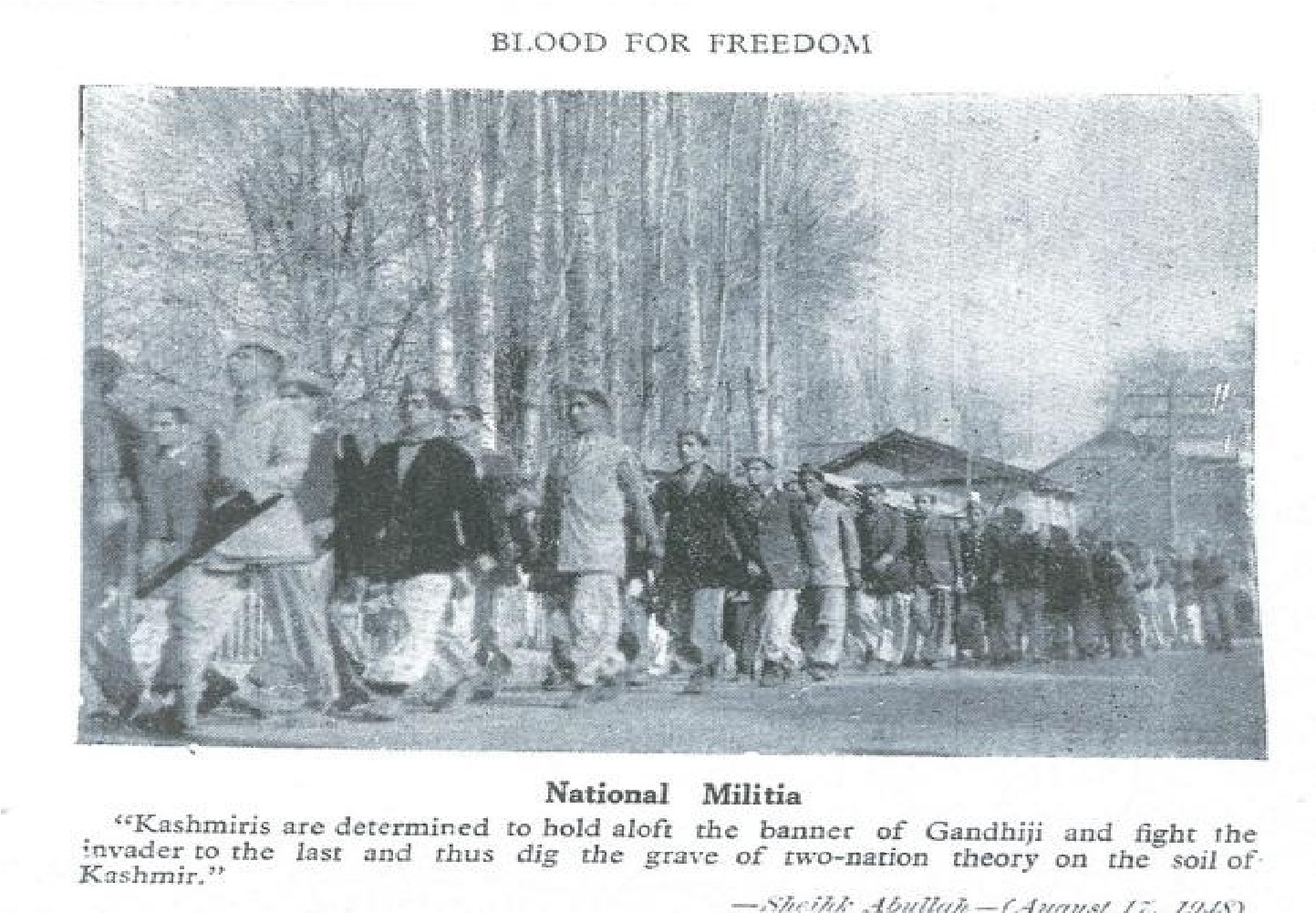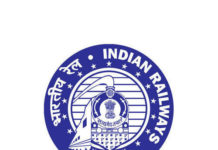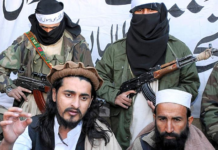COLUMN
New Delhi (NVI): It was on this day in 1947 that Pakistan invaded Jammu and Kashmir and captured parts of it, thus becoming a claimant of some of the territories of the erstwhile princely state, albeit illegally.
The Pakistani aggression, in the garb of ‘kabaili raid’ (raid by tribals), was a violation of the Standstill Agreement of August 1947 that the then ruler of Jammu and Kashmir Maharaja Hari Singh had signed with Pakistan as well as India, as he was undecided on which dominion to join.
Pakistan has been claiming that the aggression was not initiated by it and that it only intervened after “uprising” and “bloodshed” in some areas of Jammu and Kashmir like Mirpur.

However, this claim is a fake one as the Pakistani machinations are exposed by a letter dated October 12, 1947, written by K H Khurshid, who was then the Private Secretary of Pakistan founder M A Jinnah.
Khurshid had been sent to Jammu and Kashmir by Jinnah as a special envoy to assess the ground situation in the state and deliver a message of the Pakistani founder to various stakeholders as part of plan to merge the state with Pakistan.
After meeting “friends, acquaintances and stray visitors”, Khurshid wrote to Jinnah, giving his assessment of the prevailing situation. He suggested that Pakistan should think in terms of fighting as Maharaja Hari Singh was “dead against” accession to Pakistan and National Conference chief Sheikh Abdullah, who was then the most popular leader of Kashmir, too was not inclined to join Pakistan.
To give his assessment, he cited some of the speeches delivered by Sheikh Abdullah. Khurshid quoted Abdullah as saying, “I have personal grudges against Mr. Jinnah who called me ‘goonda’ and who said ‘Quit Kashmir’ was the cry of a few miscreants.”
The emissary also quoted Sheikh Abdullah as saying, “We will join him that supports our freedom demands but we have also to consider our economic position, our trade and commerce and other things. We will not be led by sentiments and I shall revolt if the Maharaja accedes to either Dominion without popular approval. Let us get our freedom first and then as free people we shall give our verdict in favour of one or the other dominion.”
Khurshid also wrote that Abdullah had “given it out privately that the Maharaja had expressed his willingness to accede to the Indian Dominion but Sardar Patel (the then Home Minister of India) refused and told the Maharaja plainly that if responsible government was not established in the State, they would not accept Kashmir’s accession. He then asks why cannot the Muslim League (led by Jinnah) do the same? The League has accepted the right of Rulers to decide the fate of the people.”
In the letter, the envoy said that “the Punjabi and Dogra Hindus of Jammu and the Kashmiri Pandits have sent a memorandum to the Maharaja asking him to accede to India. But the release of Abdullah (from jail) has brought about a change in them. They have now allied themselves with the National Conference. Of course, they are weathercocks and their only desire is to save their skins.
“In the light of the above, I am personally of the opinion, Sir, that Pakistan must think in terms of fighting (not to use war) as far as Kashmir is concerned. The other side has practically not only decided upon it but is ready for it.
“Diplomatic pressure has so far failed. The latitude that we have been giving has only served in misinterpreting us in the sense that Pakistan is regarded as weak and about to crash.
“Of course, we must go on trying as we are but we must not neglect the fighting side of it. Even if unity is established amongst Musalmans and even if a referendum is held and results in a favourable verdict for Pakistan, the Maharaja cannot be trusted for a moment to abide by it, nor the Indian Government with not accepting Kashmir’s accession in spite of an adverse verdict.
“All that Pakistan has to be ready for in such an eventuality is to supply arms and foodstuffs to the tribes within and without the State who are already sharpening their weapons. The local population can hardly carry on a peaceful movement for more than a fortnight. Successful strategy on behalf of Pakistan will leave the Maharaja with only some barren tracks of hilly south adjacent to East Punjab.
“This might sound fantastic but there is hardly any means of telling how the Maharaja is thinking. We should not be caught unawares, and the only way is to prepare ourselves to meet every eventuality.
“As regards how contact can be established between the people of the State and our people across the border, I may say, Sir, that Major Khurshid Anwar (of Muslim National Guards) is already in Rawalpindi and he can very well be trusted with the work of liaison as he belongs to the State and knows the frontier areas very well.”
The subsequent developments unfolded in tune with the suggestions made by Khurshid.
Ten days after the letter written by him, Pakistan started invasion with the clear motive of forcibly merging Jammu and Kashmir with Pakistan.
It involved looting, massacres and mass rapes of non-Muslim as well as Muslim population of J&K by the invading Pakistani forces as they marched towards the capital Srinagar.
According to estimates, around 40,000 people of J&K were killed by Pakistani forces.
Maharaja Hari Singh did not have a good fighting force, which anyway was small and hence no match to the invading forces. He immediately shifted from Srinagar to Jammu, which he thought was safer.
Meanwhile, Sheikh Abdullah mobilised thousands of Kashmiris to form a militia to fight against the Pakistani forces. The militia, which had even women cadres, were armed with guns and even agricultural tools and they put up a determined fight against the invading Pakistani forces.
However, they could not halt the advances of the rampaging Pakistani forces, who reached up to the outskirts of Srinagar and were on the verge of capturing the capital of Jammu and Kashmir.
Sensing that Pakistan was about to take control of Srinagar, Maharaja panicked and sent SOS to then government of India, headed by Prime Minister of India Jawaharlal Nehru, for help.
But he was told that the Indian government would not be able to help, since Jammu and Kashmir had not become part of the Indian union till then.
This prompted signing of the Treaty of Instrument of Accession on October 26, 1946, four days after the Pakistani invasion began. And the very next day, first contingent of Indian Army landed in Srinagar to begin the campaign to evict the Pakistani invaders from Jammu and Kashmir.
A full-fledged war ensued and the Indian Army gave a deathly blow to the Pakistani forces. However, while the Indian Army was in the process of pushing back the Pakistani forces, Nehru approached the UN Security Council with a complaint against Pakistani aggression.
On August 13, 1948 a resolution was passed with the UNSC mandating certain steps with the ultimate step being ‘plebiscite’ in the entire princely state of Jammu and Kashmir.
The first step in the UNSC Resolution, Pakistan was asked to immediately withdraw all its citizens from Jammu and Kashmir, after which India was mandated to reduce its forces to the minimum level required for maintenance of law and order.
Pakistan never implemented the first step, ensuring failure of the UNSC Resolution. Interestingly, the world body never punished Pakistan for non-compliance of its resolution.
On the other hand, Pakistan has always been presenting a distorted version of the UNSC Resolutions.






